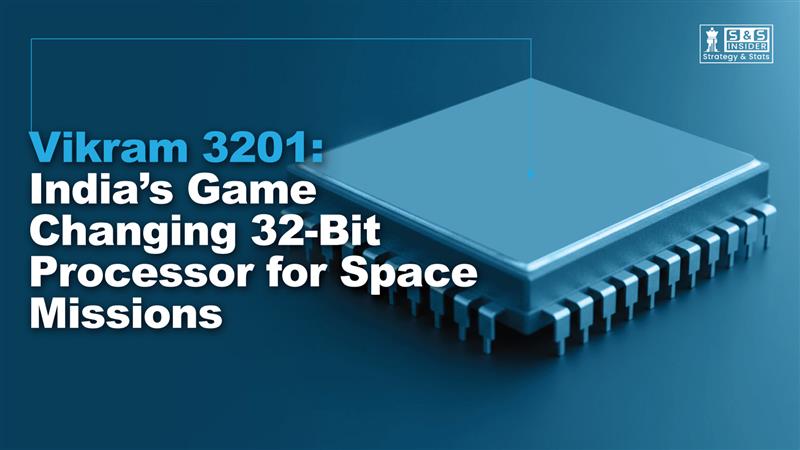
Under the "Aatmanirbhar Bharat" project, the Vikram 3201 microprocessor has become a game-changer, marking a significant milestone for India's space technology and semiconductor ecosystem. This 32-bit microprocessor is India's first space-grade, independent semiconductor, having been entirely conceived and developed domestically by the Indian Space Research Organization (ISRO) and manufactured at the Semiconductor Laboratory (SCL) in Chandigarh. It represents India's significant advancement in lowering reliance on foreign technology for vital space applications.
The Genesis of Vikram 3201:
The Vikram 1601, a 16-bit microprocessor that has been effectively powering ISRO's launch vehicles since 2009, is where the Vikram 3201 journey starts. SCL and ISRO's Vikram Sarabhai Space Centre worked together to design a complex 32-bit microprocessor that could handle the rigorous requirements of navigation, guidance, and control in rocket launches and satellites after realizing the need for increased performance, processing power, and precision in space missions.
The Vikram 3201, which was introduced at the Semicon India 2025 conference, is a major advancement. It displays strong domestic progress in a field where global supply chains are still intricate and fiercely competitive, and it represents India's expanding capabilities in both space technology and semiconductor manufacture.
Technical Excellence for Harsh Space Environments:
The Vikram 3201's capacity to function dependably in the highly hostile climatic conditions that are common in space missions is what really sets it apart. Launch vehicle avionics would benefit greatly from its remarkable temperature range of -55°C to +125°C, as well as its resistance to vibration and radiation.
The chip, which uses less than 500 mW of power and operates at a clock speed of 100 MHz, was constructed using 180-nanometer CMOS technology. With a full set of 152 instructions and a general-purpose 32-bit architecture, it supports 64-bit floating-point operations that are crucial for the accurate computations required for launch vehicle navigation and control.
For smooth connectivity with other avionics systems, the CPU incorporates two on-chip 1553B communication bus interfaces. It also has four 32-bit timers and 256 software interrupts. Its usefulness is further increased by compatibility with the Ada programming language, which is frequently utilized in high-reliability aerospace systems.
Strategic and Economic Significance:
Vikram 3201's arrival is strategically significant for India's space program and beyond. India significantly lessens its need on imported semiconductor chips, which are frequently susceptible to supply chain concerns and export restrictions, by creating and manufacturing this microprocessor domestically.
This accomplishment is in line with the Indian government's "Aatmanirbhar Bharat" initiative, which aims to make India self-sufficient in vital technology. In addition to being a breakthrough for space missions, the microprocessor may find use in the automobile, aerospace, defense, and critical infrastructure industries where dependability under harsh circumstances is crucial.
In terms of the economy, Vikram 3201 is a step closer to India's aspirational objective of being a major hub for semiconductors worldwide. Innovations like Vikram 3201 offer a solid basis for growing domestic chip design, production, and testing skills, since government investments in the semiconductor ecosystem already total over ₹1.6 lakh crore.
Proven Performance and Future Prospects:
The microprocessor's suitability for mission-critical applications has already been demonstrated by its validation in space aboard the experimental module of ISRO's PSLV-C60 mission. Its successful testing is a significant turning point that opens the door for regular deployment in a number of ISRO launch vehicles and satellite missions.
Vikram 3201 has the potential to power planetary missions and deep-space adventures in the future by influencing the design of future spacecraft. The core technology created for this chip will foster an ecosystem with end-to-end capabilities from design to deployment, speeding up additional advancements in India's semiconductor industry.
Referred to as "digital diamonds," Prime Minister Narendra Modi emphasized the significance of domestic chips such as Vikram 3201, which will be vital to the nation's future technological advancements and space missions.
Conclusion:
More than just a microprocessor, the Vikram 3201 represents India's technological tenacity, independence, and innovative foray into the field of space technology. This technology, which is completely indigenous and satisfies strict space-grade specifications, has already started to change the nature of India's space missions.
Vikram 3201 highlights India's capacity to autonomously develop vital technology in a high-stakes field by facilitating accurate control and navigation of launch vehicles and satellites. This microprocessor will boost India's reputation in the international space community, spur scientific advancement, and support both economic growth and national security as it powers further missions.
Source – NDTV/ISRO